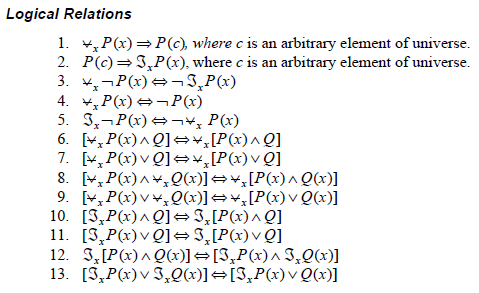SKEDSOFT
QUANTIFIERS AND LOGICAL OPERATORS: The transcription of mathematical statements involves predicates, quantifiers and logical operators. Assume that “Universe of discourse” is I and let
- E (x), x –even
- O (x), x–odd
- P (x), x–prime
- N (x), x non-negative.
(i) Every integer is even or odd.
- ∀x [E(x) Ú O(x)]
(ii) The only even prime is two
- ∀ ∀x [E(x)ÙP(x)Þx = 2]
(iii) Not all primes are odd.
![]()
(iv) If an integer is not odd, then its even.
![]()
The quantifiers may go anywhere in the transcription of mathematical statements. Let P(x, y, z) denote “xy = z” for the universe of integers. Informal statements of propositions frequently omit the universal quantification of individual variables.
(i) “If x = 0, then xy = x for all vlaues of y”
![]()
(ii) “If xy = x for every y, then x = 0”.
![]()
Propagation of negations through quantifier sequences is useful in constructing proofs and counterexamples. As an example, consider there exists a z such that x z = y, for every pair of integers x and y. This is stated as:
![]()
This is true for universe of integers I, but not true for the natural numbers N. We establish the falsity for the universe N by showing that its negation is true.
The negation has the form
![]()
which is difficult to interpret.
The equivalent form
![]()
is more tractable and can easily be shown to be true for the nonnegative integers by choosing x > y.
